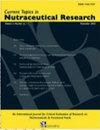Calycosin Alleviates Oxidative Stress and Pyroptosis Induced by High Glucose in Human Retinal Capillary Endothelial Cells Induced by High Glucose
IF 0.4
4区 医学
Q4 NUTRITION & DIETETICS
引用次数: 1
Abstract
Calycosin is an isoflavone isolated from the roots of Astragalus membranaceus. Due to its antioxidant and anti-inflammatory activities, it has been extensively used in traditional Chinese medicine formulations. Herein, we have evaluated the mechanism of action of calycosin using high glucose induced HRCEC cells as a model. The observed effects of calycosin include alleviation of oxidative stress induced by high glucose through promotion of SOD, GSH-Px and inhibition of ROS expression. Moreover, calycosin relieved HG-induced inflammation and pyroptosis by upregulating IL-1β, IL-18 and downregulating NLRP3, ASC, and cleaving caspase-1/procaspase-1. Calycosin also inhibited HMGB1/NF-κB pathway activation by promoting p-P65/P65, p-IκBα, HMGB1 and decreasing IκBα. All of these results support the notion that calycosin alleviates oxidative stress and pyroptosis of HRCEC cells induced by high glucose by inhibiting activation of the HMGB1/NF-κB pathway.Calycosin减轻高糖诱导的人视网膜毛细血管内皮细胞氧化应激和Pyroposis
Calycosin是从黄芪根中分离得到的一种异黄酮。由于其抗氧化和抗炎活性,它已被广泛用于中药配方中。在此,我们以高糖诱导的HRCEC细胞为模型,评估了calycosin的作用机制。观察到的calycosin的作用包括通过促进SOD、GSH-Px和抑制ROS表达来减轻高糖诱导的氧化应激。此外,calycosin通过上调IL-1β、IL-18、下调NLRP3、ASC和裂解胱天蛋白酶1/原蛋白酶-1来缓解HG诱导的炎症和pyroptosis。Calycosin还通过促进p-P65/P65、p-IκBα、HMGB1和降低IκB a来抑制HMGB1/NF-κB通路的激活。所有这些结果都支持这样一种观点,即calycosin通过抑制HMGB1/NF-κB通路的激活来减轻高糖诱导的HRCEC细胞的氧化应激和焦下垂。
本文章由计算机程序翻译,如有差异,请以英文原文为准。
求助全文
约1分钟内获得全文
求助全文
来源期刊
CiteScore
1.10
自引率
0.00%
发文量
36
审稿时长
>12 weeks
期刊介绍:
Current Topics in Nutraceutical Research is an international, interdisciplinary broad-based peer reviewed scientific journal for critical evaluation of research on chemistry, biology and therapeutic applications of nutraceuticals and functional foods. The major goal of this journal is to provide peer reviewed unbiased scientific data to the decision makers in the nutraceutical and food industry to help make informed choices about development of new products.
To this end, the journal will publish two types of review articles. First, a review of preclinical research data coming largely from animal, cell culture and other experimental models. Such data will provide basis for future product development and/or human research initiatives. Second, a critical evaluation of current human experimental data to help market and deliver the product for medically proven use. This journal will also serve as a forum for nutritionists, internists, neurologists, psychiatrists, and all those interested in preventive medicine.
The common denominator of all of the topic to be covered by the journal must include nutraceuticals and/functional food. The following is an example of some specific areas that may be of interest to the journal. i) Role of vitamins, minerals, antioxidants and phytonutrients on cardiovascular health, cancer, diabetes, ocular health, mental health, men’s health, women’s health, infant nutrition, ii) Role of herbals on human health, iii) Dietary supplements and sleep, iv) Components of diet that may have beneficial effect on human health, v) regulation of apoptosis and cell viability, vi) Isolation and characterization of bioactive components from functional foods, vii) Nutritional genomics, and viii) Nutritional proteomics.

 求助内容:
求助内容: 应助结果提醒方式:
应助结果提醒方式:


